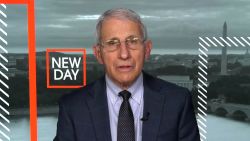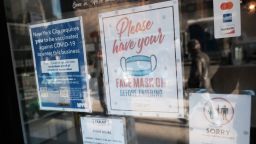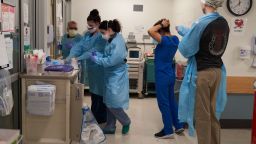President Joe Biden and his team repeatedly promised more Covid-19 testing, including at-home kits that deliver rapid results, but they are now admitting a virus that is more adaptable than the politicians who fight it has outpaced them again.
For many Americans, this holiday season may be remembered for hours spent in long testing lines, or fruitlessly searching pharmacy shelves for antigen tests as the Omicron variant took over the previous Delta wave. Already patchy testing has been exposed by the latest highly transmissible variant, and the US is being compared unfavorably to other developed nations where citizens have easy access to rapid tests for free.
Biden told governors in a virtual meeting Monday that his administration should have done more to speed up the availability of rapid testing, before his pledge this month for 500 million kits due to begin distribution in January, which will be too late to help this week’s holiday crunch.
“It’s not enough. It’s clearly not enough. If we’d have known, we’d have gone harder, quicker if we could have,” the President said, referring to the Omicron storm that has quickly overwhelmed existing testing capacity. In an interview with ABC News just before Christmas, Biden denied that shortfall in at-home testing represented a “failure.” But he added: “You could argue that we should have known a year ago, six months ago, two months ago, a month ago.” The President said he wished he had thought about ordering 500 million at-home tests “two months ago.”
Such comments by the President, while candid, are unlikely to improve public confidence in a White House that vowed to shut Covid-19 down but sometimes seems to have underestimated the staying power of the virus and the scale of the challenge. The administration has had some important successes in fighting the emergency despite the politically motivated reluctance of millions of Americans to take the President’s advice on the vaccines that could save their lives. And on Monday, the US Centers for Disease Control and Prevention changed its guidance in a way that may make the current outbreak less disruptive to everyday life, shortening the recommended times that people should isolate when they’ve tested positive for Covid-19 from 10 days to five days if they don’t have symptoms – and if they wear a mask around others for at least five more days.
But not for the first time, when it comes to testing, the White House is being forced to play catch-up following successive waves of a pandemic uncannily able to exploit political divides, slow moving bureaucracy and the impatience and weariness of the public with a crisis soon to enter its third year.
Another political blow
The frustrating search for tests endured by many Americans may also have a political consequence for Biden as he searches for a bounce back after a grim few months that saw his approval ratings tumble. He is, after all, on the record promising to fix a dearth of testing that has been laid bare by the recent viral surge.
Running on competence, he put the issue at the center of his 2020 campaign, which was partly rooted in highlighting ex-President Donald Trump’s failures during the first year of the pandemic. And in an address to the nation last March, for instance, the President said: “We continue to work on making at-home testing available.”
More than nine months later, he is now admitting not enough has been done. Such comments make it hard to accept arguments that the White House was taken off guard by the Omicron variant. Many experts have said for months that rapid testing needs to be more available to the public. It’s hardly a secret that new variants of the virus were inevitable. And a recent episode in which White House press secretary Jen Psaki mocked the idea of sending a test to all Americans – a goal Biden has now embraced – further muddled the administration’s stance on this new phase of the pandemic.
The confusion has frustrated some public health professionals who say there simply aren’t enough kits to permit people who are sick, those exposed to someone who has been infected with the virus, and people who want to travel and attend gatherings to get tested.
“It really is shameful that we don’t have the amount of tests that are necessary to be able to use it as the robust containment tool that we know it is when used effectively,” Dr. Chris Pernell, a public health physician and fellow of the American College of Preventive Medicine, told CNN’s Alisyn Camerota on Monday.
All of this may give credence to midterm election messaging from Republicans that Biden has failed in his self-appointed number one task – beating the virus – even though it’s the GOP’s repeated attempts to politicize the struggle that have often set back the pandemic response. The party’s continuing devotion to Trump, who once urged public health officials to do less testing so they would uncover fewer Covid-19 cases, also casts doubt on its sincerity on this issue.
A dangerous turn in the crisis
New controversy over testing follows another critical twist in the pandemic. There were more than 200,000 new cases of Covid-19 alone on Sunday, and some experts expect that figure to hit half a million per day soon. While there are hopeful indications that this variant causes fewer hospitalizations than previous incarnations of Covid-19, even a tiny proportion of serious cases could swamp health systems given this level of infections. This is especially the case in areas still battling a surge in the Delta variant of the virus and in parts of the country where vaccination rates remain comparatively low.
The government’s top infectious diseases specialist, Dr. Anthony Fauci, admitted on CNN’s “New Day” on Monday that the testing situation could be better, despite consistent warnings by experts for months that it isn’t sufficiently expansive.
“You know, testing has always been an issue,” Fauci told CNN’s Kaitlan Collins, adding that the situation had been exacerbated by hordes of Americans wanting to travel during the holidays just as Omicron struck.
“It’s been a very, very strong run on testing,” said Fauci, director of the National Institute of Allergy and Infectious Diseases. “Obviously, not making any excuses for it: we should have had more tests available. But hopefully now as we get into the first couple of weeks in January, that’ll get much better.”
Biden has made several recent moves designed to fix the shortfall. At the beginning of December, he ordered health insurers to reimburse Americans for the cost of at-home testing, which can run to $20 for a kit or more. Then he promised Americans that he would make half a billion rapid tests available for free, though they will not start rolling out until at least next month. While that influx could be critical as Omicron spreads, it can’t ease the Christmas surge or frustration among people who think they are infected now.
Washington caught off guard again
At-home tests are not infallible and are not a panacea for ending the pandemic. They are less important than vaccines and boosters in battling the building Omicron wave. But they are a useful tool that could allow Americans to make informed decisions about their own health and plans. They could confirm whether a sniffle is in fact Covid-19 and help people protect vulnerable relatives or decide to stay out of work to avoid infecting others.
The shortage of testing is all the more remarkable since the US led the world in the rapid deployment of vaccines, in a program that started under the Trump administration and was deployed by the Biden White House team.
Some companies that sought to roll out rapid tests have complained about a prohibitively difficult regulatory process at the US Food and Drug Administration. There have also been complaints about a flood of testing options, including some from abroad that have swamped the capacity to evaluate them. This is a critical issue since rushing approvals of tests or allowing those with deficiencies to get into the system could harm the credibility of testing more broadly – and be a net negative in the drive to end the pandemic.
Yet this situation also appears to have some of the classic ingredients of a Washington screw-up. A White House consumed by crises seems to have taken its eye off the ball to some extent. It’s also possible that increasingly urgent signals from the Oval Office and the suddenness of the Omicron wave haven’t effectively worked their way down the bureaucratic chain. Events have overtaken the politicians and now there’s a risk of a blame game. None of which is likely to move a country closer to the deliverance from the pandemic that it craves in 2022.

























